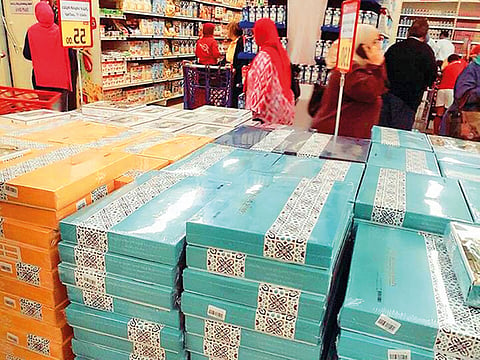Prophet birthday features high on Egyptians’ calendar
Dealers are reporting unusually sluggish sales for festive candy as austerity bites

Cairo: The Moulid Al Nabwi, or the birthday of the Prophet Mohammad (peace be upon him) is just round the corner. Traditionally, the annual occasion features high on Egyptians’ calendar.
A centuries-old Egyptian landmark is celebrating the event with speciality sweets, a tradition believed to have been started by the Fatimides who ruled the country in the 10th century.
In the lead-up to the occasion, patisseries across Egypt display a wide assortment of mouth-watering sweets. They combine a mixture of starch, sugar, honey, and nuts including hazelnuts, almonds and pistachios. Turkish delight is also a popular treat for the occasion, which this year falls on November 20 in Egypt.
On the occasion, families traditionally buy the festive sweets to present to their married daughters in a gesture meant to show they still care about them. Men offer sweet gifts to their fiancées along with colourfully dressed dolls on the same occasion. Until recent years, these dolls were made of sugar, but due to hygienic reasons, plastic dolls have replaced them.
However dealers are reporting an unusually sluggish sale rates selling the special sweets.
“Compared to last year, prices of the Moulid sweets have only risen by around 5 per cent,” said Mahrous Abdul Wahed, an employee at a famous patisserie in central Cairo.
“The rise comes as a result of recent increases in prices of electricity, water and petrol,” he told Gulf News.
“But as you can see, the number of customers is still very low. We hope the demand will rise in the coming days. This is an occasion, which Egyptians of different classes do not miss to celebrate,” he added.
According to Abdul Wahed, boxes of the seasonal sweets this year sell for prices ranging from 200 Egyptian pounds (Dh41.6) up to LE900 (Dh187.2), depending on their sizes and contents.
The Moulid sweets are also popular with children and youngsters, who insist on munching on them, especially those rich in nuts.
“Since my childhood, I have developed a liking for the moulid sweets,” said Alaa Mahmoud, a father of three. “My children like the candy, too. But due to the rise in the prices of everything, I’ve decided to decrease the amounts of sweets to celebrate this year’s Moulid in order to save money for other things such as fees for private lessons for my children,” Mahmoud, a government employee, added.
In 2016, Egypt floated its local pound and gradually cut state subsidies on energy as part of painful austerity measures that secured the country a badly needed IMF loan of $12 billion over three years.
Also Read: Egyptians find solace in Sufi sessions
Egyptians have since experienced a spate of hikes in prices of different goods and services.
“Like everything else, prices of the Moulid sweets have shot up,” said Mahmoud, the father of the three, estimating the hike of about 30 per cent against last year. “In many stores, sweets sell for at least 100 pounds per kilo. This is unaffordable for many people, who need the money for other life essentials.”
Mahmoud noted that the price tags are lower at backstreet sweets shops, but their goodies are low-quality.
In an attempt to shore up sales, several confectioners have offered small candy boxes for relatively low prices especially in working-class areas.
“Compared to previous seasons, the purchasing power of the people has dropped because they have other spending priorities,” said Hassan Mokhtar, a commerce official.
“But the demand for the candy usually picks up on the eve of the Moulid. This is a typical Egyptian tradition, which most people are keen to keep, whatever their circumstances are,” he told this paper.
Egyptians also celebrate the Prophet’s birthday by religious gatherings where verses from the Holy Quran and hymns praising him are recited.
Followers of mystic Sufi orders, carrying banners decorated with devotional pledges, parade the streets in populous neighbourhoods and rural areas on the same occasion.
However, moderate clergymen commend celebrating the Prophet’s birthday, saying it shows devotion to him and joy for his birth.





